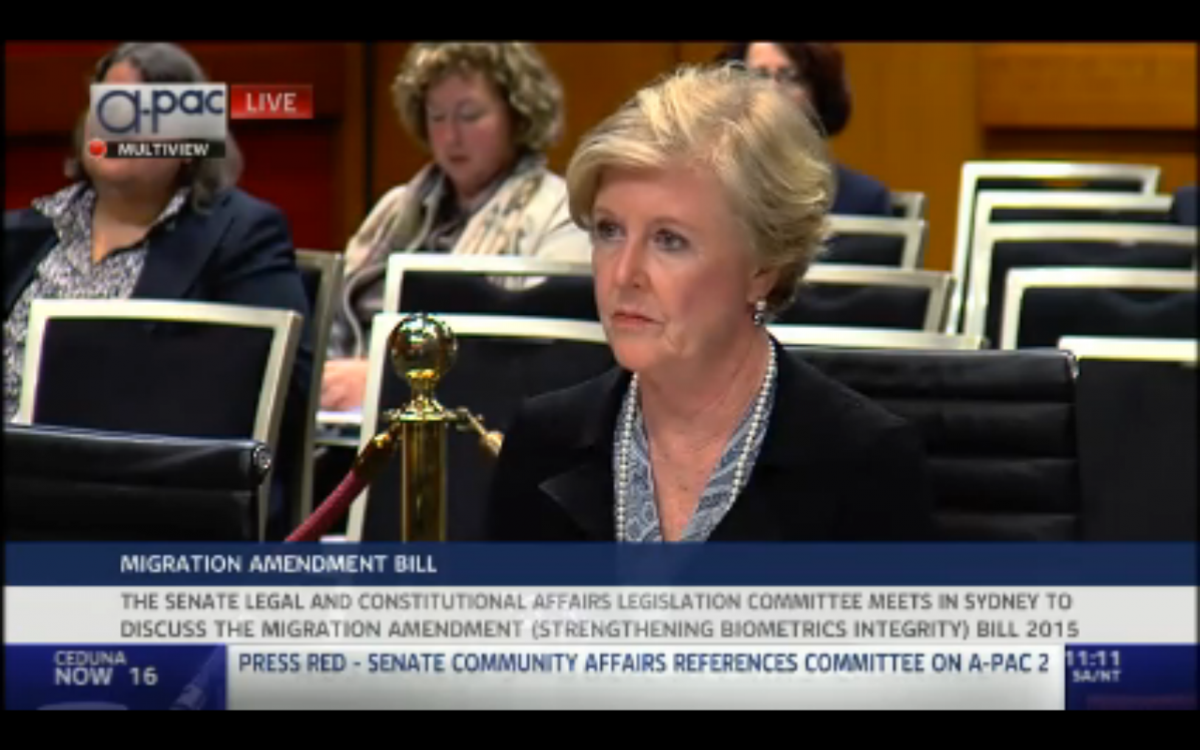Serco guards working in immigration detention centres could be granted broad powers to use force on asylum seeker with greater impunity than police, a Senate Committee has heard.
The President of the Australian Human Rights Commission, Gillian Triggs, told the Committee that legislation before parliament lacks the safeguards found in comparable laws governing when state and federal police can use force.
Triggs said force was usually only sanctioned where it was objectively judged to be “reasonable and necessary” but that the bill being mooted had significantly lower thresholds, which hinged on whether an officer was acting in “good faith”.
“The thrust of the legislation seems to be out of kilter with the way we normally deal with the use of force by police,” she said.
According to Triggs, the “good faith” test would make it near impossible for courts to make findings against officers, as their subjective motivation would have to be proved.

The legislation in question proposes that an “authorised officer” may use “reasonable force” in order to protect life, property, or the health of an individual in an immigration detention centre. It also allows such force to be used to “maintain the good order, peace or security of an immigration detention facility”.
This includes force strong enough to result in detainees suffering grievous bodily harm, and potentially death.
If passed into law, the bill would allow “almost open opportunity for an officer to use force in a context that’s not accountable [to the courts],” Triggs said.
Responding to the allegations this evening, figures from the Department of Immigration said comparisons to state laws had been made during the drafting of the legislation, citing an examination WA laws as an example.
Though not going into detail, they said there were some similarities in the laws and some differences, adding the intention of the bill was to make detention centres a safer environment.
Other submissions to the Committee have warned the broad powers could be used by guards to suppress legitimate protests, demonstrations, or sit-ins occurring inside detention centres.
Triggs told the Committee that the Human Rights Commission already received complaints from people held in detention centres relating to the use of force by guards.
In its submission the Commission outlined examples, including an instance where a person was grabbed by the throat and subject to an unauthorised search, and another where a child sustained injuries after being transferred.
“A seven year old boy detained at Woomera Immigration Reception and Processing Centre was struck across the legs with a baton by an officer of Australasian Correctional Management Pty Ltd, the then detention services provider there,” another case study noted.
While collecting evidence for the Forgotten Children report , Triggs and her staff heard that children on Christmas Island had been subject to “unnecessary” force by Serco guards and placed in chokeholds and wrist-locks.
The potential use of force on children has been flagged as a key concern by legal experts and opponents of the bill.
Greens Senator Sarah Hanson-Young echoed Triggs’ warning – also raised by the Parliamentary Joint Committee On Human Rights – that the bill increased the scope of guards’ powers beyond those offered to police.
“It strikes me as incredibly peculiar that the Australian Parliament is being asked to give security guards in detention centres more power, less oversight, and more immunity [than police],” Hanson-Young said.
“To put it bluntly, that really is the upshot of this proposal,” Triggs responded.
Despite the objections, there is general agreement that guards working in detention centres need clearer guidelines in regards to the use of force.
Triggs agreed there were circumstances in which force was necessary but told the Committee this bill went too far.
“Serco, as a company, was not asking for what they got,” she said.
“They were asking simply for clarity. They weren’t asking for a greater right to use force.”
In giving her evidence, Triggs once again found herself before Committee Chair Ian Macdonald, who led recent attacks on the President in the wake of the Commission’s Forgotten Children report.
“I know our first witness in particular is well familiar with senate committee hearings,” Macdonald chimed.
The Queensland Senator asked Triggs for further detail about the guard who hit a minor with a baton while the child was being held by its mother.
“Perhaps his excuse was he was aiming for the mother…not that that excuses it,” he suggested.
Triggs took the question on notice.
Donate To New Matilda
New Matilda is a small, independent media outlet. We survive through reader contributions, and never losing a lawsuit. If you got something from this article, giving something back helps us to continue speaking truth to power. Every little bit counts.



